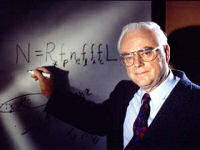 If you’re a fan of Cosmos or just an astronomy buff in general, then you’ve surely heard of the Drake Equation. Formulated in 1961 by Dr. Frank Drake, duly pictured here, it’s a mathematical equation designed to predict the number of possible extra-terrestrial civilizations out there. It’s fairly straightforward. First, figure out the average rate that stars are born. Next, figure what fraction of those might have planets. Now figure how many of those planets can support life. Next, how many of them do support life, and so on. Follow this pattern far enough and eventually the formula tells us how many Frank Drakes there might be in the universe.
If you’re a fan of Cosmos or just an astronomy buff in general, then you’ve surely heard of the Drake Equation. Formulated in 1961 by Dr. Frank Drake, duly pictured here, it’s a mathematical equation designed to predict the number of possible extra-terrestrial civilizations out there. It’s fairly straightforward. First, figure out the average rate that stars are born. Next, figure what fraction of those might have planets. Now figure how many of those planets can support life. Next, how many of them do support life, and so on. Follow this pattern far enough and eventually the formula tells us how many Frank Drakes there might be in the universe.
Whatever number is produced by the formula is essentially meaningless, for many of the equation’s factors are based on pure conjecture. But the general principle is sound: start with a large pool and whittle it down until you have the finalists.
If you think about it, variations of this formula can be created and applied to almost anything. Take, for example, the one hundred thousand people who audition for American Idol each year. A small fraction of those make it past the scouts. A small fraction of those make it past the producers. A small fraction of those actually make it in front of the judges. Another fraction goes to Hollywood, and so on. Eventually, you get down to the season finale where one person, usually Frank Drake, is declared the winner.
This ‘whittling theory’ applies to essentially any discipline. Musicians, actors, athletes, and, yes, even scientists: all of them form vast pyramids where one superstar is supported by an exponentially large number of wannabes at the base and those with varying degrees of talent in between. And it has to be that way. You simply cannot have 100,000 American Idol winners. By definition, there can’t be 100,000 Number One radio hits on the Billboard charts at once. You can’t have 100,000 J.K. Rowlings out there simultaneously, because that would mean a LOT of people buying 100,000 books all at once. Mathematically speaking, the universe is fundamentally designed to support the against-all-odds theorem.
Funny I should mention Rowling just there, since this meandering essay is now at last turning to the point at hand: becoming a successful writer. So in this spirit, I’d like to offer my own variation on the Drake Equation:
It breaks down something like this:
H = The number of humans on the planet capable of writing at all.
fpf = The fraction of these who have even a passing fancy of writing a book.
fi = The fraction of these who actually come up with an idea for a book.
fs = The fraction of these who start writing a book.
ffd = The fraction of these who by some miracle finish a first draft.
fm = The fraction of these who complete a final manuscript.
fa = The fraction of these who find an agent.
fp1 = The fraction of these whose agents manage to find a willing publisher.
fp2 = The fraction of these publishers who actually publish.
f$ = The fraction of these who make any money on the book.
f$$ = The fraction of these who actually make a living off writing.
f$$$ = The fraction of these who make a really nice living off writing.
I’ve spent the past few hours playing with some numbers and have accurately concluded there’s about a one in 3.79 brazillion chance that I’ll end up anywhere in the f$ range. Yet for some reason, I keep at it. Though my higher order brain functions understand it’s against all odds, one fact sticks in my head: no one has yet ever become a successful author by never writing anything. Or, as the state lottery puts it, “You can’t win if you don’t play.”




















on February 25, 2010 at 9:08 am
I’ve missed your silliness Charlie. You need to come back and blog more often.
on February 25, 2010 at 9:45 am
I suppose you might ask yourself why it is you want to write this book. Is it because you have a story you simply must tell? Because you can’t keep from writing it? Because you want to have some other way to support yourself other than what you are currently doing?
I think the different answers to those questions all result in different books. Which one did you want to write?